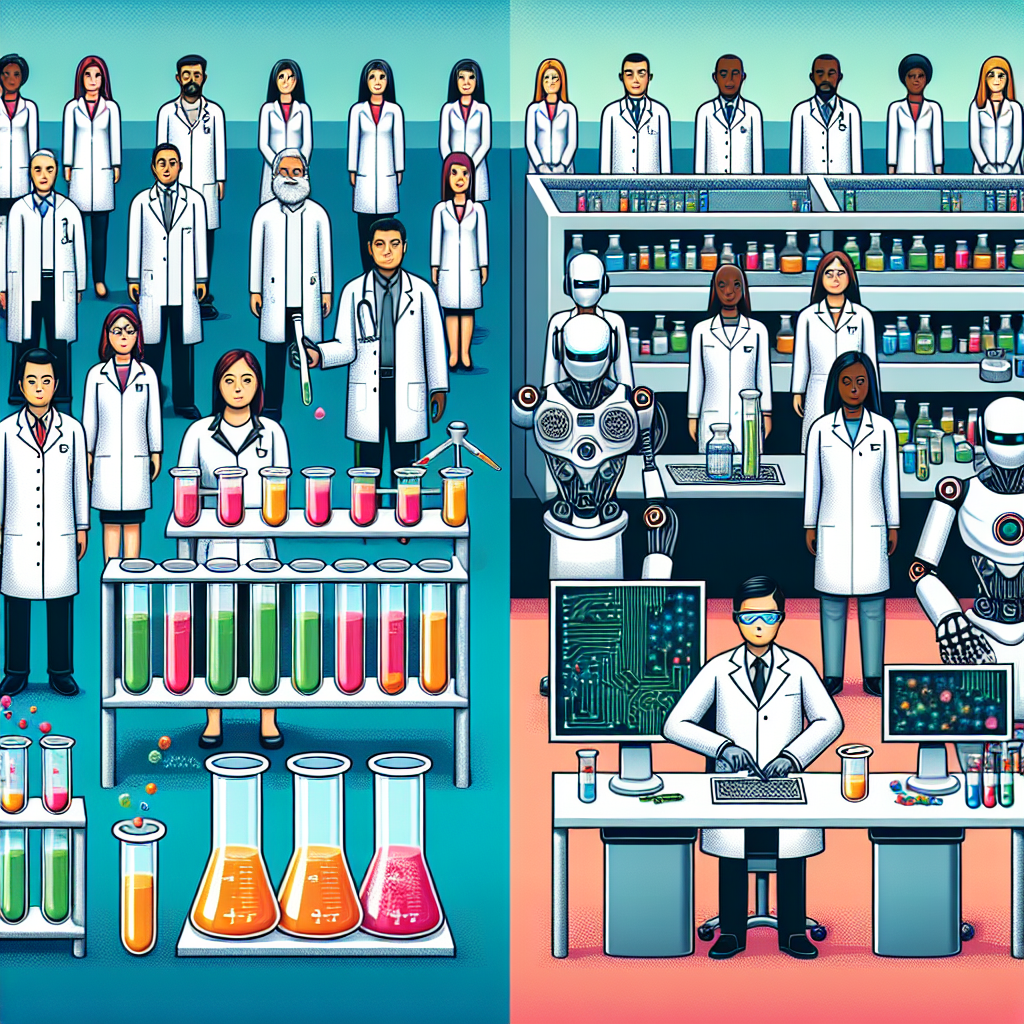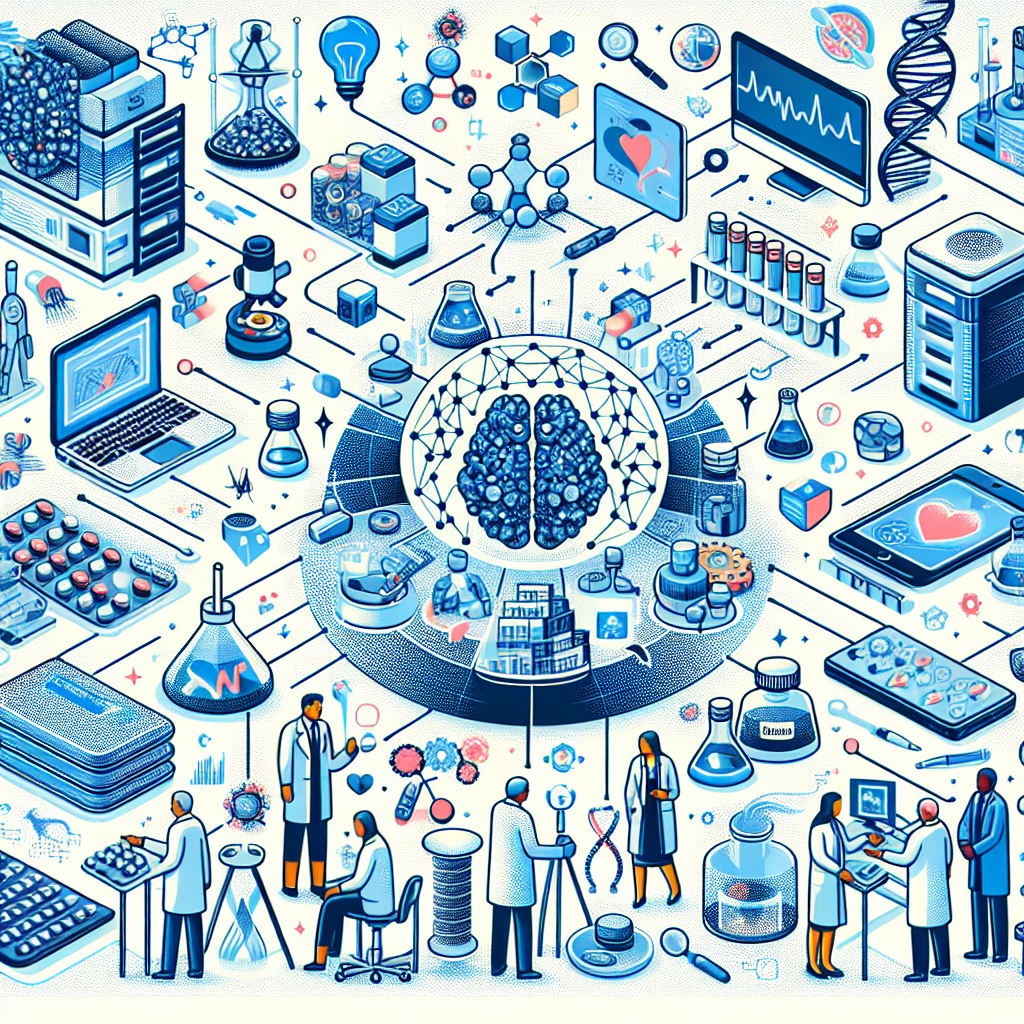How AI is Transforming the Pharma Industry

Discover how AI is revolutionizing the Pharma Industry! Learn about the latest advancements, the impact on drug discovery, and much more. Don’t miss out on this technological revolution. Click here to explore more.
Exploring the Impact of AI on Drug Discovery in the Pharma Industry
Artificial Intelligence (AI) is revolutionizing various sectors, and the pharmaceutical industry is no exception. The advent of AI in the pharma industry is transforming the way drugs are discovered, developed, and brought to market. This transformation is not only accelerating the drug discovery process but also making it more cost-effective and efficient.
Drug discovery, the process of identifying potential new medicines, is a complex and time-consuming endeavor. It involves a series of intricate steps, from understanding the disease or condition, identifying potential targets, testing the efficacy and safety of the compounds, to finally bringing the drug to market. Traditionally, this process could take up to 15 years and cost billions of dollars. However, with the integration of AI, the pharma industry is witnessing a paradigm shift in drug discovery.
AI algorithms are capable of sifting through vast amounts of data at an unprecedented speed. This ability allows researchers to identify potential drug targets and predict the effectiveness of a drug candidate much faster than traditional methods. For instance, machine learning, a subset of AI, can analyze and learn from complex biological and chemical data, thereby predicting how a potential drug compound will behave. This predictive capability can significantly reduce the time spent in the early stages of drug discovery.
Moreover, AI can also help in the optimization of drug candidates. By analyzing the structure of a potential drug and comparing it with a vast database of existing drugs and their effects, AI can suggest modifications to enhance the drug’s efficacy or reduce its side effects. This process, known as in silico drug design, can save considerable time and resources that would otherwise be spent on trial and error in the lab.
AI’s impact on drug discovery extends beyond the lab. It is also transforming clinical trials, a critical phase in the drug development process. AI can help design more efficient clinical trials by predicting the best population for a trial, optimizing the trial design, and monitoring the trial’s progress in real-time. This can lead to faster, more accurate results, and ultimately, quicker approval of new drugs.
Furthermore, AI can also play a significant role in post-market surveillance. By analyzing real-world data from various sources, AI can identify potential adverse effects of a drug that may not have been apparent during clinical trials. This can lead to quicker interventions and improved patient safety.
While the potential of AI in drug discovery is immense, it is not without challenges. Issues such as data privacy, algorithmic bias, and the need for regulatory frameworks need to be addressed. However, with ongoing advancements in technology and a growing understanding of AI’s capabilities, these challenges can be overcome.
In conclusion, AI is transforming the pharma industry by making drug discovery faster, more efficient, and cost-effective. It is enabling researchers to identify potential drug targets quicker, optimize drug candidates, design efficient clinical trials, and monitor drug safety post-market. As the pharma industry continues to embrace AI, we can expect to see more innovative, effective, and safer drugs reaching patients quicker than ever before. The future of drug discovery, it seems, is intertwined with the future of AI.
The Role of Artificial Intelligence in Streamlining Clinical Trials

Artificial Intelligence (AI) is revolutionizing various sectors, and the pharmaceutical industry is no exception. One of the most significant areas where AI is making a substantial impact is in streamlining clinical trials. Clinical trials are a critical component of the drug development process, and they are notoriously complex, time-consuming, and expensive. However, with the advent of AI, the landscape of clinical trials is undergoing a significant transformation.
AI is playing a pivotal role in enhancing the efficiency and effectiveness of clinical trials. It is doing so by automating various processes, reducing errors, and speeding up the time it takes to bring a drug to market. One of the ways AI is achieving this is through predictive analytics. AI algorithms can analyze vast amounts of data from previous trials and use this information to predict outcomes of future trials. This not only saves time but also reduces the risk of failure, as potential issues can be identified and addressed before the trial begins.
Moreover, AI is also helping in patient recruitment, a process that has traditionally been a significant bottleneck in clinical trials. Identifying and enrolling suitable participants is a challenging task, often leading to delays. However, AI can sift through electronic health records and other data sources to identify potential candidates quickly and accurately. This not only speeds up the recruitment process but also ensures that the selected participants are a good fit for the trial, thereby increasing its chances of success.
In addition to predictive analytics and patient recruitment, AI is also transforming the way data is collected and analyzed during clinical trials. Traditionally, data collection has been a manual process, prone to errors and inconsistencies. However, AI can automate this process, ensuring that data is collected accurately and consistently. Furthermore, AI can analyze this data in real-time, providing researchers with immediate insights and allowing them to make adjustments as necessary. This real-time analysis is particularly beneficial in early-phase trials, where quick decision-making can be crucial.
AI is also playing a role in monitoring patient adherence to treatment protocols during clinical trials. Non-adherence can significantly impact the results of a trial, leading to inaccurate conclusions. AI can monitor patients’ adherence to treatment protocols in real-time, alerting researchers if a patient deviates from the prescribed regimen. This allows for immediate intervention, ensuring the integrity of the trial.
Lastly, AI is helping to improve the transparency and reproducibility of clinical trials. By automating various processes and providing real-time analysis, AI can create a detailed record of the trial, which can be easily reviewed and replicated. This not only enhances the credibility of the trial but also facilitates peer review and regulatory scrutiny.
In conclusion, AI is playing a transformative role in streamlining clinical trials in the pharmaceutical industry. By automating processes, reducing errors, and providing real-time analysis, AI is enhancing the efficiency and effectiveness of clinical trials. As AI continues to evolve and improve, its impact on clinical trials and the broader pharmaceutical industry is likely to grow even further. The future of clinical trials, it seems, is inextricably linked with the future of AI.
How AI is Revolutionizing Patient Care in the Pharma Industry
Artificial Intelligence (AI) is rapidly transforming various sectors, and the pharmaceutical industry is no exception. The advent of AI in the pharma industry is revolutionizing patient care, making it more personalized, efficient, and effective. This transformation is not only beneficial for patients but also for healthcare providers and pharmaceutical companies.
One of the most significant ways AI is revolutionizing patient care in the pharma industry is through personalized medicine. AI algorithms can analyze a patient’s genetic makeup, lifestyle, and environmental factors to predict their susceptibility to certain diseases. This information can then be used to develop personalized treatment plans that are more likely to be effective. For instance, AI can help identify which patients are more likely to respond positively to a particular drug, thereby reducing the trial and error often associated with finding the right medication.
Moreover, AI is also enhancing drug discovery and development, a process that traditionally takes several years and billions of dollars. AI can analyze vast amounts of data much faster than humans, identifying potential drug candidates and predicting their effectiveness and side effects. This not only speeds up the drug discovery process but also makes it more cost-effective. Furthermore, AI can help in designing clinical trials, selecting suitable candidates, and monitoring their progress, thereby improving the efficiency and success rate of these trials.
AI is also playing a crucial role in improving medication adherence, a significant challenge in patient care. Non-adherence to medication can lead to treatment failure, increased healthcare costs, and even death. AI-powered apps can remind patients to take their medication, track their adherence, and alert healthcare providers if a patient is not following their medication regimen. These apps can also provide personalized feedback to patients, encouraging them to stick to their medication plan.
In addition, AI is transforming the way pharmaceutical companies interact with patients. AI-powered chatbots can answer patients’ queries 24/7, provide information about drugs, and even assist in scheduling appointments. This not only improves patient engagement but also frees up healthcare providers’ time, allowing them to focus on more critical tasks.
Furthermore, AI is helping in predicting and managing disease outbreaks. AI algorithms can analyze data from various sources, such as social media, news reports, and health records, to predict potential outbreaks. This can help in taking preventive measures and planning healthcare resources more effectively.
While the benefits of AI in patient care are immense, it is also essential to address the challenges associated with its implementation. These include issues related to data privacy, the need for robust and transparent AI algorithms, and the requirement for adequate training of healthcare providers in using AI tools. However, with the right policies and regulations in place, these challenges can be overcome.
In conclusion, AI is revolutionizing patient care in the pharma industry, making it more personalized, efficient, and effective. It is enhancing drug discovery and development, improving medication adherence, transforming patient engagement, and helping in disease management. As the pharma industry continues to embrace AI, it is set to bring about a paradigm shift in patient care, promising a future where healthcare is more patient-centric and data-driven.